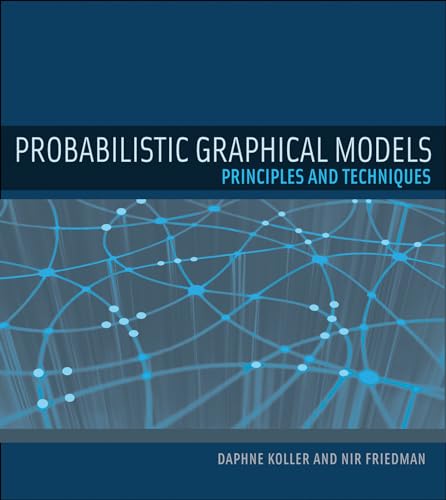Probabilistic Graphical Models: Principles and Techniques (Adaptive Computation and Machine Learning series) - Hardcover

Synopsis
A general framework for constructing and using probabilistic models of complex systems that would enable a computer to use available information for making decisions.
Most tasks require a person or an automated system to reason—to reach conclusions based on available information. The framework of probabilistic graphical models, presented in this book, provides a general approach for this task. The approach is model-based, allowing interpretable models to be constructed and then manipulated by reasoning algorithms. These models can also be learned automatically from data, allowing the approach to be used in cases where manually constructing a model is difficult or even impossible. Because uncertainty is an inescapable aspect of most real-world applications, the book focuses on probabilistic models, which make the uncertainty explicit and provide models that are more faithful to reality.
Probabilistic Graphical Models discusses a variety of models, spanning Bayesian networks, undirected Markov networks, discrete and continuous models, and extensions to deal with dynamical systems and relational data. For each class of models, the text describes the three fundamental cornerstones: representation, inference, and learning, presenting both basic concepts and advanced techniques. Finally, the book considers the use of the proposed framework for causal reasoning and decision making under uncertainty. The main text in each chapter provides the detailed technical development of the key ideas. Most chapters also include boxes with additional material: skill boxes, which describe techniques; case study boxes, which discuss empirical cases related to the approach described in the text, including applications in computer vision, robotics, natural language understanding, and computational biology; and concept boxes, which present significant concepts drawn from the material in the chapter. Instructors (and readers) can group chapters in various combinations, from core topics to more technically advanced material, to suit their particular needs.
"synopsis" may belong to another edition of this title.
About the Author
Daphne Koller is Professor in the Department of Computer Science at Stanford University.
Nir Friedman is Professor in the Department of Computer Science and Engineering at Hebrew University.
"About this title" may belong to another edition of this title.
Search results for Probabilistic Graphical Models: Principles and Techniques...
Probabilistic Graphical Models: Principles and Techniques (Adaptive Computation and Machine Learning series)
Seller: Zoom Books Company, Lynden, WA, U.S.A.
Condition: very_good. Book is in very good condition and may include minimal underlining highlighting. The book can also include "From the library of" labels. May not contain miscellaneous items toys, dvds, etc. . We offer 100% money back guarantee and 24 7 customer service. Seller Inventory # ZBV.0262013193.VG
Probabilistic Graphical Models: Principles and Techniques (Adaptive Computation and Machine Learning series)
Seller: HPB-Red, Dallas, TX, U.S.A.
Hardcover. Condition: Acceptable. Connecting readers with great books since 1972. Used textbooks may not include companion materials such as access codes, etc. May have condition issues including wear and notes/highlighting. We ship orders daily and Customer Service is our top priority! Seller Inventory # S_456503572
Probabilistic Graphical Models: Principles and Techniques (Adaptive Computation and Machine Learning series)
Seller: HPB-Red, Dallas, TX, U.S.A.
Hardcover. Condition: Good. Connecting readers with great books since 1972! Used textbooks may not include companion materials such as access codes, etc. May have some wear or writing/highlighting. We ship orders daily and Customer Service is our top priority! Seller Inventory # S_451945093
Probabilistic Graphical Models: Principles and Techniques (Adaptive Computation and Machine Learning series)
Seller: Wonder Book, Frederick, MD, U.S.A.
Condition: Very Good. Very Good condition. A copy that may have a few cosmetic defects. May also contain light spine creasing or a few markings such as an owner's name, short gifter's inscription or light stamp. NOT AVAILABLE FOR SHIPMENT OUTSIDE OF THE UNITED STATES. Seller Inventory # V17A-04500
Probabilistic Graphical Models : Principles and Techniques
Seller: Better World Books, Mishawaka, IN, U.S.A.
Condition: Good. Pages intact with minimal writing/highlighting. The binding may be loose and creased. Dust jackets/supplements are not included. Stock photo provided. Product includes identifying sticker. Better World Books: Buy Books. Do Good. Seller Inventory # 8790163-75
Probabilistic Graphical Models: Principles and Techniques (Adaptive Computation and Machine Learning series)
Seller: BooksRun, Philadelphia, PA, U.S.A.
Hardcover. Condition: Good. 1. It's a preowned item in good condition and includes all the pages. It may have some general signs of wear and tear, such as markings, highlighting, slight damage to the cover, minimal wear to the binding, etc., but they will not affect the overall reading experience. Seller Inventory # 0262013193-11-1
Probabilistic Graphical Models
Seller: World of Books (was SecondSale), Montgomery, IL, U.S.A.
Condition: Good. Item in good condition. Textbooks may not include supplemental items i.e. CDs, access codes etc. Seller Inventory # 00094608808
Probabilistic Graphical Models: Principles and Techniques (Adaptive Computation and Machine Learning series)
Seller: Textbooks_Source, Columbia, MO, U.S.A.
hardcover. Condition: Good. 1st Edition. Ships in a BOX from Central Missouri! May not include working access code. Will not include dust jacket. Has used sticker(s) and some writing or highlighting. UPS shipping for most packages, (Priority Mail for AK/HI/APO/PO Boxes). Seller Inventory # 000967006U
Probabilistic Graphical Models: Principles and Techniques (Adaptive Computation and Machine Learning series)
Seller: Bellwetherbooks, McKeesport, PA, U.S.A.
hardcover. Condition: Very Good. Very Good Condition - May show some limited signs of wear and may have a remainder mark. Pages and dust cover are intact and not marred by notes or highlighting. Seller Inventory # MIT-HCc-VG-0262013193
Probabilistic Graphical Models â" Principles and Techniques
Seller: WorldofBooks, Goring-By-Sea, WS, United Kingdom
Hardback. Condition: Very Good. The book has been read, but is in excellent condition. Pages are intact and not marred by notes or highlighting. The spine remains undamaged. Seller Inventory # GOR012964767
Buy Used
Ships from United Kingdom to U.S.A.
Quantity: 1 available

